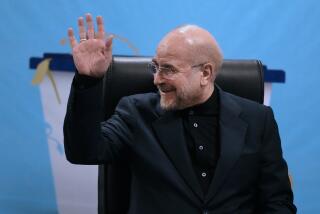Iranian Election Chief Declares Bans Illegal
- Share via
TEHRAN — Iran’s chief of elections warned Saturday that he would not allow next month’s legislative elections to proceed unless hard-liners retract their mass disqualification of candidates.
About 80 reformist lawmakers took their weeklong protest against the disqualifications a step further Saturday, beginning dawn-to-dusk fasts.
The Guardian Council, an appointed body controlled by religious hard-liners, has triggered a political crisis by disqualifying more than a third of the 8,200 people who applied to run in the Feb. 20 elections. State media controlled by hard-liners say those barred fell short on the necessary criteria, but reformists say the move was political and intended to skew the vote in favor of conservatives.
President Mohammad Khatami, a reformer, has condemned the disqualifications and hinted that he might resign if they were not reversed. And 27 provincial governors threatened to quit by Monday unless the bans were reversed.
The official in charge of convening the polls, Deputy Interior Minister Morteza Moballegh, a reformist, told reporters Saturday he regarded the disqualifications illegal.
“If I reach the point where I feel I can’t hold elections in accordance with the law, I won’t hold such elections,” Moballegh said.
He said many candidates were disqualified “without any solid legal evidence,” including more than 80 sitting legislators.
In a sign religious leaders were backing down, Iran’s supreme leader, Ayatollah Ali Khamenei, last week ordered the Guardian Council to reconsider the disqualifications and laid down criteria that appeared to be easier to meet.
Reformers welcomed Khamenei’s intervention, but said they would wait to see how the council responded.
Khamenei chooses the council’s 12 members, and some reformist legislators have said the councilors would not have acted without the supreme leader’s approval.
The Feb. 20 elections are seen as a test for Iran’s reformers, whose popularity has waned because of their perceived failure to deliver on promises of liberalization.
Reformists believe the ruling Islamic establishment needs to become more open and respect the demands of its overwhelmingly youthful population. But hard-liners fear such reforms would undermine the principles of the 1979 Islamic Revolution.
More to Read
Sign up for Essential California
The most important California stories and recommendations in your inbox every morning.
You may occasionally receive promotional content from the Los Angeles Times.










